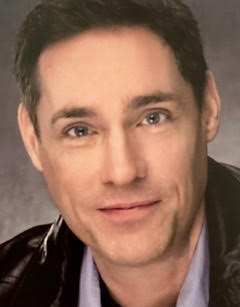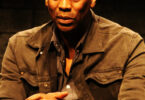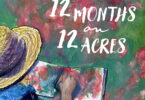by Queer Stories 2.0, Gary Anderson, Gary Boelhower,
Terence Diamond, Robin Goldfin, Oliver Hummel, Jude Kamilhor, Thomas Ledcke, and Jeannie McCormack

Doug McKeown was the facilitator of Queer Stories for Boys, editor of our book (2004, Thunder’s Mouth Press), master storyteller, monster storyteller, actor, theater designer, filmmaker, teacher, videographer, and more. He was a true renaissance man. We will miss him.
“I Remember” exercises have become the backbone of Queer Stories workshops. Our stories are based in memory, and one person’s memories often help jog another’s. Memory begets memory, they are fruitful, and multiply. We honor those we love by keeping their memories alive. These are our memories of Doug, in no particular order. May his memory be for a blessing.
When I think of Doug McKeown, I think of a Queer Superhero! I didn’t know Doug well, but every time I was in his company I felt as if I were in the company of someone who courageously showed up for life. He would share life stories and his brave story telling would often give way to vulnerable truths.
I only knew Doug very little through a few Queer Stories online. The last story time we shared was very near his death, but he was there, fully present, fully engaged, and full of stories—fully himself.
I remember Doug’s infectious enthusiasm, a beacon that supported and guided me to do something I thought I’d never do in my wildest dreams. If not for Doug, I would have never had the opportunity, nor courage, to tell one of my queer stories in front of a live audience in a New York City theater. It is a gift I will always cherish.
I remember the Doug McKeown Museum, which was housed, conveniently, at the residence of Doug McKeown. Every time Queer Stories 2.0 [post-Pandemic] got together, someone would bring up a random topic, and Doug would say, “Ah, I’ll be right back.” A minute or two later he would return with some incredible sculpture or painting that he had done years before related to that very topic. He presented them to us, not to brag, but rather to say, “Oh here’s something I made. I hope you like it.” I will always be inspired by his enthusiasm, talent, curiosity, and humility.
I never met Doug in person. I remember him as a face on a zoom screen who responded often to the fragmented stories I would tell from the prompt we were using during a Saturday Queer Stories session. He seemed to appreciate the humor in my tales. He would respond in kind with a story that he was reminded of, but he also encouraged me to complete the whole tale after several rounds.
When Doug began to share about his past in theatre and film, I was fascinated. I appreciated his work when he showed it —the short film with the cardboard piano was a hoot— and I marveled at the stories he told about his career in set design and filmmaking. As his childhood reminiscences unfolded over the many Saturdays we met, I realized that Doug was a one-of-a-kind weirdo growing up in a 50s-60s suburb similar to the one I grew up in. His “weirdness” was a sign of great sensitivity and creative talent. It gave me some perspective on my own experience of being a weirdo during my childhood.






Doug is one of the few people I’ve gotten to know over zoom. I would have liked to have met up with him and chat over coffee. I feel a certain loss of that opportunity, and of the brevity of the time I got to know Doug. It reminds me to stop taking it for granted that people who interest me will be around forever. It reminds me that I won’t be around forever and that I better stop putting things off until tomorrow.
I remember Doug’s obsession with Rufus Wainwright.
I remember meeting with Doug at the Cupcake Café on 9th Avenue in 1994. The previous weekend Doug attended my Queer Stories for Boys performance at Dixon Place and was interested in learning more about the group. What I remember about that early afternoon was that we talked so easily and with such enthusiasm until evening. This was easy to do with Doug. He made everyone feel like they had just answered the million-dollar question, hardly ever containing his excitement. He was eager to share his life story and equally supportive and generous to listen to mine. Doug is the teacher we all wish we had growing up. Someone who cherishes learning and exchanging ideas. Thank you Doug, your encouragement and generosity had a lasting impact on my life.
I cut the part about my ill-advised critique of Timothée Chalamet in Dune. Doug set me straight and I rewatched the film and now agree. Chalamet is a genius and probably the best American actor of the past century. Doug, I said it; now stop tormenting my dreams.
I spoke to Doug only a few times to make some type corrections on a story he wrote which appeared on our website. As we spoke, I learned that he was a perfectionist about his work. During the short time that I was acquainted with him, he gave us an artwork he had done from his theatre days for a fundraising project. This was such a kind and generous gesture since he was dealing with a serious illness. During our phone conversations, I was inspired by his unusual wisdom and inner strength.
I have learned more about his special qualities from the memories of others and through an email he sent which I feel to be an important message to all: “I just see no reason why we can’t always aim for the best work.”
I am grateful for the short time I knew him.
I remember it was sometime after my mother died in 1999. I was coming to the Queer Stories workshops and working on a long poem about my mother’s death. She died from a metastatic breast cancer and had incredible pain. I called the poem Ode to Sleep, comparing death to sleep as many writers have done before. Doug listened closely and then asked the title again. I told him Ode to Sleep. He asked me “how are you spelling that?” I told him O-D-E. He said “No, spell it the other way.” I loved him for that. And for many other things.
In the last few years of his life, Doug’s science-fiction cult film found a new following, and he was contacted by many people about The Deadly Spawn. He became a kind of celebrity again, and he glowed in the attention. I was pleased that he was getting that attention. He was a man of the theatre. Attention must be paid.
I remember the fresh homemade blueberry muffins Doug would bake and bring to Queer Stories workshops when we met at the Community Center. So good. G&S





Leave a Comment